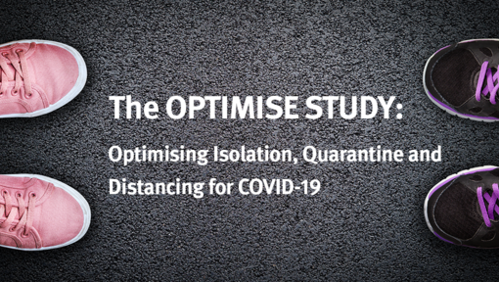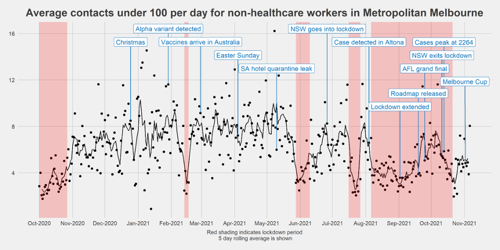
The success of the Optimise Study in shaping Victoria’s and Australia’s response to the COVID-19 pandemic paves the way for similarly ambitious research projects in the future, a webinar wrapping up the project was told.
Optimise was a large, multidisciplinary and multi-platform study, looking at what was happening with COVID-19, how it was directly and indirectly impacting Victorians, and rapidly reporting this back to government and the broader community, said Professor Margaret Hellard AM, Burnet Deputy Director and one of the principal investigators and co-chairs of the study.
The study was led by Burnet Institute and Doherty Institute in collaboration with the University of Melbourne, Swinburne University, La Trobe University, Monash University and other community partners.
The formal part of the study finished in September 2022 after two years’ of data collection focussing on priority populations impacted by COVID-19, including healthcare and aged care workers, regional Victorians, young people, people with pre-existing chronic illnesses, people working in other high risk environments such as factories and warehouses, and people from culturally and linguistically diverse communities.
To ensure the study was hearing voices from communities impacted by COVID-19, they recruited and trained bilingual data collectors from Arabic, Mandarin and Dinka-speaking communities to support recruitment and data collection in participants’ preferred languages.
Through surveys, diaries and other qualitative research conducted by Optimise, the team was able to report on how the community was responding to the pandemic and the directions from government, and what people were saying about it.
Optimise directly informed Victoria’s response to the pandemic, Professor Hellard said.
“A critical component of what we were really doing is saying, well, what’s the evidence base to inform decisions? And how can we, on a certain level, keep things calm and reduce outrage?”
For example, through collecting contact data over time – asking people to share sensitive information about who they were seeing on given days and what types of interactions they were having – the team was able to demonstrate the impact of lockdowns on people’s social contacts and movements.

People’s contacts declined dramatically during lockdowns, said Dr Alisa Pedrana, a chief investigator and working group lead for the study at Burnet.
“We were able to show that people were really good at adopting policies and government directions, and using them to mitigate and reduce the impact of COVID-19,” Dr Pedrana said.
The study also identified early on the potential of COVID fatigue among communities and how this might limit governments’ social licence to enact COVID-19 restrictions, Professor Hellard said.
“The vast majority of people were wanting governments to provide support, leadership, guidance, to have some level of protection to themselves and their families. It wasn’t like they wanted everything to stop, but they recognised there needs to be a balance.”
Just before Australia’s National Cabinet announced on 30 September 2022 that people would no longer need to isolate following a positive COVID-19 result, an Optimise report showed the vast majority of people surveyed were supportive of ongoing initiatives like this.
“The middle, possibly more silent group of people, were actually still very interested in the government playing a role in the response, even though governments of all persuasions have sort of stepped back on this,” Professor Hellard said.
“At this point of the COVID-19 pandemic, we’re in this really interesting place of governments making decisions that are not fully driven by public health and scientific evidence, or are only when it suits them.”
Over the two years, Optimise produced over 30 reports for the government and a key message throughout was that it’s important to consider how public health measures can be made more sustainable and acceptable to communities.
For example, how we can have a cultural change around the wearing of masks as a COVID-19 prevention measure to protect our community, in the same way we’ve had a cultural change around the benefits of not smoking, she said.
“When people say these things can’t happen, I look at big changes in public health over the year and say ‘yes, they can’.
“While the Optimise study has come to a close, it’s critically important to think about how do we continue to do work like this, which is multi-platform, multidisciplinary, collaborative and across multiple institutes to answer complex problems.”

